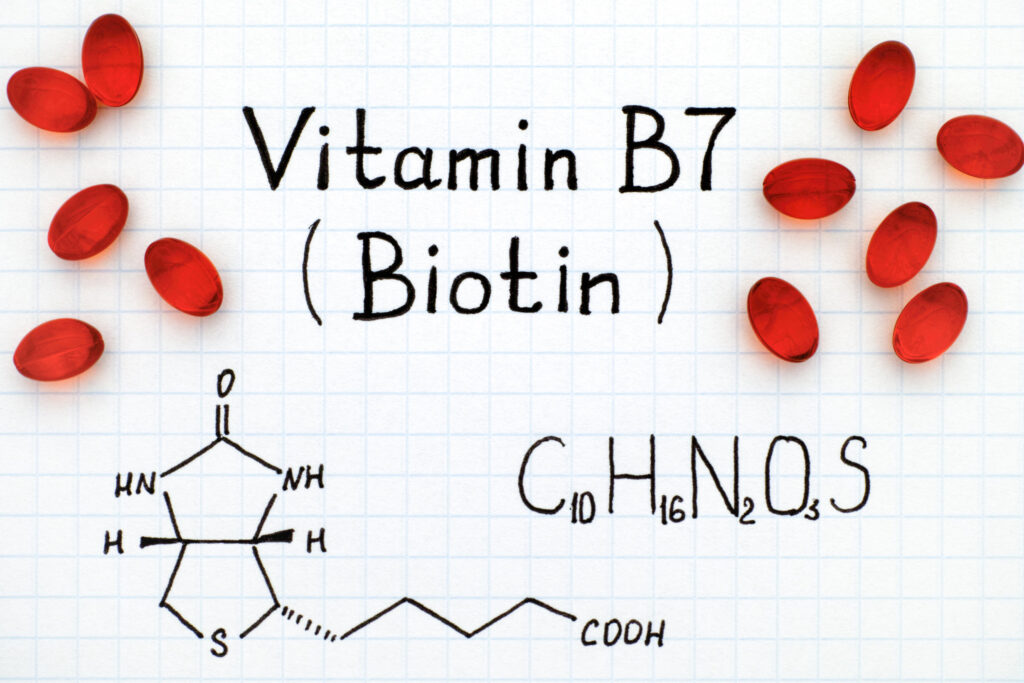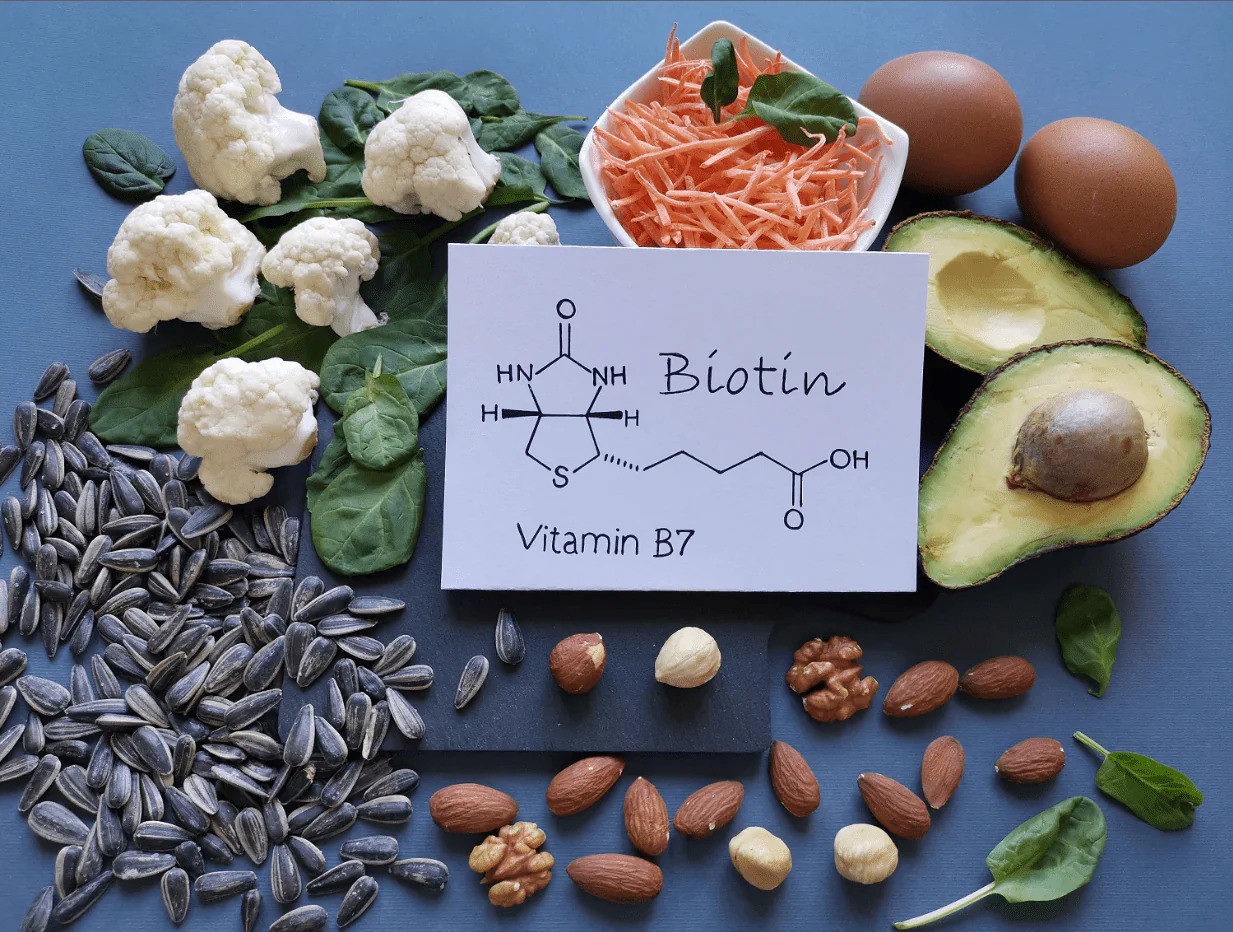If you’re focused on maintaining healthy hair and nails, you might have heard of or are already taking biotin. Biotin is a substance commercialized as a supplement strong hair and nails for years, but experts think otherwise. However, biotin has been also found to interfere with blood test results potentially causing doctors to mistreat or mis diagnose patients. The thing is biotin might just be part of several supplements so how much biotin is good for you?
What You Need to Know About Biotin

Biotin, also known as B-7, is part of the B vitamin family and is found in small amounts in various foods. It’s a water-soluble vitamin, meaning it’s not stored in the body but can be metabolized by gut microbes, taken as a supplement, or obtained from food. It’s considered essential because it helps convert food into energy and aids in the metabolism of proteins, carbohydrates, and fats.
Biotin goes by many names, including:
- Vitamin B7
- Biotine
- Biotina
- Biotine-D
- D-Biotin
- Coenzyme R
- Vitamin H
- W Factor
Biotin and Health
Biotin supplements have long been a commercial treatment popularized for its role in healthy skin, hair, and nails. While it is true that biotin deficiencies can lead to skin and nail problems, there is no concrete research to show supplements can help. A few studies do exist showing how biotin supplements were helpful, but the studies have no citations and researchers feel that sometimes issues like hair loss can even resolve on their own. Thus, it cannot be stated 100% that biotin supplements were responsible.
According to an article in Harvard Health, there aren’t enough studies published to suggest if biotin can indeed benefits skin, nails, and hair.
Symptoms of Biotin Deficiency
Biotin deficiency can occur, with common symptoms being hair thinning (often with loss of hair color) or a red, scaly rash around the eyes, nose, or mouth. Other symptoms may include depression, lethargy, hallucinations, and tingling in the arms and legs. However, these symptoms can also be caused by other conditions, so it’s important to rule out other potential causes. Smoking has been associated with mild biotin deficiencies.
Remedies for Biotin Deficiency
- If you’re deficient in biotin, consuming it can restore balance and alleviate symptoms.
- Using biotin to treat skin rashes like seborrheic dermatitis in infants is generally ineffective.
- Consuming Biotin can also increase the thickness of fingernails and toenails in people with brittle nails.
- For hair loss unrelated to a deficiency, biotin can be beneficial when taken orally with a zinc supplement and a topical cream containing clobetasol propionate.
- Pairing biotin with a chromium supplement may help regulate blood sugar levels in individuals with poorly controlled diabetes.
- Combining biotin with chromium might also aid in improving the HDL to LDL cholesterol ratio in those with type 2 diabetes.
Other conditions that might require you to increase your biotin intake are:
- Biotin consumption may be effective in alleviating diabetic nerve pain.
- People undergoing kidney dialysis may need to supplement with biotin.
- Biotin is being researched as a potential supportive treatment for multiple sclerosis.
- However, biotin hasn’t been proven effective for treating hair loss caused by chemotherapy.
When Can Biotin Use Be Problematic?
Generally, biotin can lead to falsely normal or abnormal test results. If you’re taking Synthroid for hypothyroidism, it’s crucial to stop biotin intake several days before testing your thyroid levels, as it can affect TSH test results. Biotin can also impact tests for heart failure, pregnancy, cancer, and iron deficiency anaemia. Recently, biotin has been found to interfere with vitamin D-level testing. It may also alter how the liver processes certain medications, so it’s important to first consult your doctor before considering any supplement intake.
How Much Biotin?
There is no RDA for biotin due to lack of evidence to suggest a daily amount needed in healthy adults. However, the adequate amount of biotin for men and women is set at 30mcg daily with lactating women needing 35mcg.
Till now, no upper limit for biotin exists which is why some supplements contain 1000 to 5000 mcg. However, every individual has a unique metabolism and pathology influenced by other factors such as underlying conditions and genetics. It is always advisable never to dose yourself with biotin without consulting a doctor.
Obtaining nutrients directly from food is always the best approach. Adults should aim for 30 micrograms of biotin daily while breastfeeding women should aim for 35 micrograms.
Foods rich in biotin include:
- Egg yolks
- Salmon
- Animal liver (be mindful of saturated fat)
- Dairy products (be mindful of saturated fat)
- Yeast
- Avocados
- Nuts and seeds
- Sweet potatoes
- Cauliflower
Takeaway
In nutrition, there’s a saying that “too much of a good thing is not good.” Biotin plays a significant role in helping your body process food, but more is not always better. The question how much biotin does not really have a definite answer, but consult your doctor to determine if you can get this essential vitamin from food. If not, ask your doctor to recommend a suitable brand and dose of biotin for your individual health needs.

